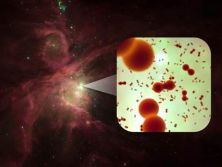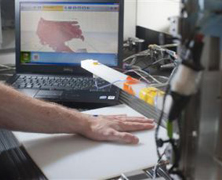Astronomers have an exciting announcement -- a planet about 600 light years away has been discovered in a "habitable zone", which means it could potentially support life. The planet has a 260-day orbit, which puts it right in the middle of the "habitable zone" around a distant star.
Read More »Search Results for: scientists
Scientists Discover that Psychopaths Have Weaker Brain Links
Scientists might finally have come up with a bit more information about why psychopaths have such extreme behavioral abnormalities.
Read More »Chewing Gum Enhances Brain Function, Say Scientists
A team of psychologists at St. Lawrence University have discovered that chewing gum actually has measurable cognitive benefits. Chewing gum during certain activities has proven (in this study) to be very effective at boosting a person's mental performance.
Read More »Scientists Confirm Oxygen Molecules Exist in Space
Yes, oxygen exists in space. No, this doesn't mean a "Space Aqua-Lung" is in development.
Read More »Scientists Stalking Twitter to Monitor Health Problems
Scientists at Johns Hopkins University are interested in your life -- no, really. They sifted through over 2 billion public tweets, and came up with some really interesting information about certain health problems.
Read More »German Scientists Develop Robot That Can Touch You — Literally
The latest advancement in robotics has come from Germany, where scientists have developed a new robotic model that has 'sensitive skin', allowing it to simulate the sensation of touch.
Read More »Scientists Agree — 170 Year Old Salvaged Beer Too Salty to Drink
Ah, Finland. Home of hard-metal-cello musicians and delicious Karelian pasty. Also, apparently home to scientists who spend their time trying to drink really, really old beer. Who funds Finland's research programs, again?
Read More »Scientists Want to Make Photosynthesis Better
Scientists at the University of Cambridge have announced plans to begin researching the possibility of increasing photosynthesis in crops.
Read More »Scientists Demonstrate “Printable Skin”
At the American Association for the Advancement of Science conference in Washington, Cornell University and Wake Forest University scientists showed off technology that could lead to printing skin tissue.
Read More »Yale Scientists Develop World’s First Anti-Laser
Two scientists at Yale have developed a type of anti-laser that they feel could one day be used to help treat cancer.
Read More » Gearfuse Technology, Science, Culture & More
Gearfuse Technology, Science, Culture & More









